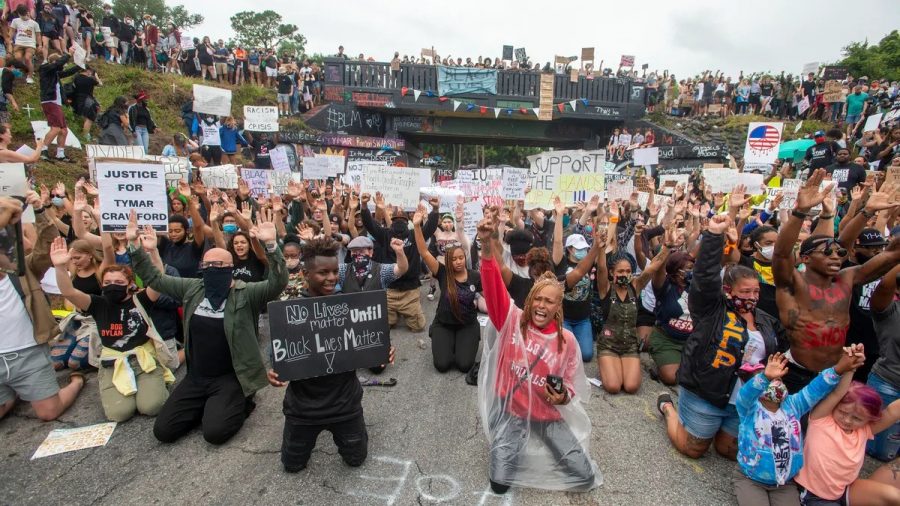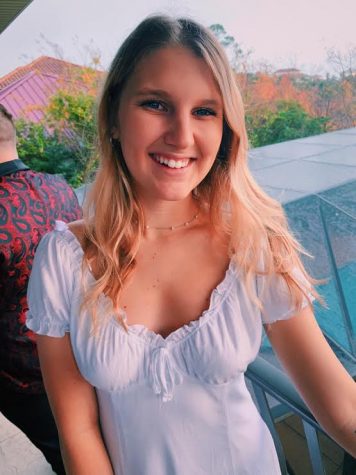Conquering Historical Achievements in the 21st Century
March 26, 2021
In May of 2017, students attending Chiles High School in Tallahassee, Florida began a petition to ban the confederate flag from school grounds. The petition was created after a small group of students had been flying the flag from their truck tailgates throughout the student parking lot for a few months. As talk of the petition made its way around the campus, tension between students became visibly noticeable. Slowly the group of students flying the confederate flag from their vehicles grew in numbers and in defiance of the petition, attracting local news agencies.
Later in the week on May 17th, numerous vehicles pulled into school before the first bell, only to be met by a crowd of agitated students. The two groups of students stood in opposing lines as they timidly argued about the presence of the confederate flag. News anchors watched close by with cameras focused as if they knew what was about to occur. Conversation over the flag continued and caused one student to stand on the edge of his tailgate and wave the flag side to side in the air. Uproar quickly ensued.
Students and parents were furious, and the anger came from two different sides: one addressing their outrage towards the flag and the other the importance of their freedom of speech. The following school day displayed a different scene, a once rambunctious parking lot filled with screaming children was completely empty except for staff vehicles. The sidewalks where reporters and video cameras once set up to catch the drama, now held grimly armed police officers.
Chiles High School received severe threats over social media the night following the parking lot incident. What the exact threat was never got confirmed, but it ended with the ban of all flags, with exception of the American flag, from school grounds. After a few weeks of publicity, this problem was not spoken of on a public level again and students were seen flying numerous flags on school grounds the following year.
This was my high school.
I begin with this story to first acknowledge what my version of normal was. Growing up in northern Florida, you cannot escape our country’s unfortunate history. The ways of the south were classified as heritage by some and by others, blatant racism. Regardless of the conflicting views publicity was never given to the topic of racial upset because it didn’t match the demographic. This was the first time a conversation about racism within our community was talked about on a public level. Usually, the most interesting topic to find on a local Tallahassee news station was updates on the weather. So, when reports came through of children waving around confederate flags people gossiped, but because of the normality of the flag in our area, it was brushed away as soon as our summer vacation began. What I am trying to get at is that never in my life did I anticipate what would occur in the summer of 2020. But man was I all for it when it did.
George Floyd’s death in May of 2020 sparked what I saw as an extension of the Civil Rights Movement. Although my Florida, public school education would have had me believe the Civil Rights Movement ended on behalf of systemic change it ended on behalf of Martin Luther King Jr.’s assassination. Racism did not end in the 1960’s and people who were born and raised on the premises that skin color could make you superior did not disappear. America continues to deal with these social problems today and this past summer was a prime example of that.
I believe the Black Lives Matter movement began as a revolt against police brutality but transformed into a national debate about systemic racism. A large portion of the United States had been long awaiting the publicity of these types of discussions, with BLM protests occurring in numerous cities throughout all 50 states by the end of the summer.
During the summer, mid-pandemic and rainstorms, the Pensacola community gathered at the Graffiti Bridge to protest on behalf of BLM. As the summer went on, protests took place more and more across our city.
Every aspect of this movement was met with conflicting views. What was to be considered a protest verse a riot? Or what was to be considered a matter of human rights verse a political statement? Is white privilege real? Is systemic racism still a problem?
These demonstrations throughout our country have caused me to pay closer attention to the actions of my community on behalf of people of color and I have been watching to see what, if any, influence it has caused.
Members of the University of West Florida have talked with me about the correlation between the social revolt of this past summer and the progression in the university’s inclusivity and acceptance. The 53rd Senate was elected this past February and with that came many individual achievements for our students in the black community.
Sydney Grant, Tommy Judd, and Dierre Johnson all claimed the “first” title for their acquired positions in SGA this year, 2021. Sydney Grant was elected the first black female Senate Pro Tempore, Tommy Judd was elected the first black Chief Justice, and Dierre Johnson was elected the first black female Budget and Allocations Committee Chair.
Systemic racism has had a long history of making it difficult for people of color to obtain executive positions and not just on the federal level. Our very own UWF student involvement is an example of how that problem can become overlooked. I talked with all three of them about how they felt towards our community’s response after this past summer and their perspectives on the change their titles and positions play on our university’s past and future.
I imagine it would be odd to picture yourself making history as an individual today on any scale. Society makes it seem as if many of the “firsts” have already been done.
This was exactly why Sydney Grant was unaware she was going to be the first black female Senate Pro Tempore until a week before she was appointed.
“To have to sit there and process the fact that it took this long for there to be one [a black senate pro tempore] surprised and continues to surprise me,” Grant said.
Grant first joined UWF SGA last February as a Senator for the College of Education and Professional Studies. Grant’s first paying position was the University Affairs Chairwoman which she was encouraged to apply for by a friend that was already heavily involved in SGA. Grant ended up loving being involved with SGA and continued to push forward, landing her this “first” title.
It surprised all three of the students that claimed these titles how many “firsts” are left waiting to be occupied by people of color throughout our university’s student involvement. On one end this aspect presents an amazing opportunity for UWF students of color, to be able to strive to make school history. But on the other end, it leaves you wondering how these titles haven’t been claimed in over 50 years of the university being operational.
Tommy Judd pointed out Pensacola’s proximity to the Florida-Alabama border and how he believes that plays a factor in our community and university’s lag. Alabama was the last state in our nation to desegregate.
“So, it makes sense that the evolution of issues like this is slower as people often forget, segregation ended back in the 60s and many people who were in high school or college at the time, still live here today and may not have been for it,” Judd said. “I think that Pensacola is evolving to understand the social issues in regard to race but still has a long way to go.”
Judd is a Navy veteran as of 2016 and worked for a retail company in Jacksonville, Florida. In 2017, Judd was given a job opportunity as a general manager in Pensacola and has been here ever since.
Unlike Grant and Judd who grew up outside of the Pensacola area, Dierre Johnson is a true, born and raised, Pensacola local. Johnson has seen from a personal point of view how this past summer changed the Pensacola community.
“The community did a great job of coming together and bringing awareness to this issue,” Johnson said. “We got our point across to local officials and accomplished most of our goals, such as the removal of a confederate statue.”
Johnson believes that more can always be done to help the black community and that there is still plenty of progress to be made in our local community towards overcoming our country’s past. Johnson is proud to be a part of the generation of UWF Argonauts that have taken a large step in the direction of change.
“To be honest, 2021 seems late for any “first” title, but I would rather focus on the idea that this shows that we are taking the right steps to becoming a more inclusive environment,” Dierre Johnson said. “We as a group realized how progressive our 53rd Senate has been this academic year.”
The students I spoke with are proud to be able to say that they have conquered these historical achievements. They understand the history of working past narrow-minded thinkers, but they are living proof the work is worth it. They do not want to belittle the past or forget the negativity that was bestowed upon their people since the beginning of this country, but instead they would rather focus their energy and on others to the positivity of change. A lot needs to be done in our country on both sides of the racial argument before these students and others like them will feel as though their achievements reflect the decisions and perspectives of our entire population.
“The title of being the “first” means to me that students coming into UWF or anyone else who knows of our school and looks into us, can see that people who look like me can hold executive positions and even higher if they wanted to,” Grant said. “To me this position is a real-life version of ‘I can’.”
The events of this past summer have helped these students and others throughout our community and communities across the nation regardless if individuals or mainstream media draw attention to it. Conversations are being held and therefore change is being made, even if it is one SGA position at a time. The change that created noticeable inclusivity on our UWF campus is hopefully the same change future generations will be taught about in their public-school textbooks. The hope is that this will give them, no matter what they look like on the outside, the inspiration they need to be of kind heart and strong mind on the inside.


